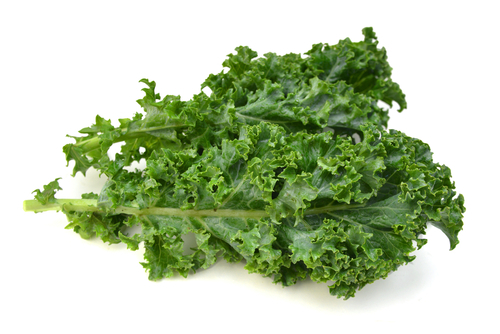Is Kale Bad For You?
Also Known As: borecole
Short answer
For people with digestive issues like IBS, kale should be avoided, as it can further worsen symptoms. For everyone else, kale is nothing but a nutrient-packed superfood that can benefit the body in a number of ways.
Very healthy and numerous health benefits. A few harmful qualities may be associated, but only under certain circumstances such as an allergic reaction.
View Full Grading System
Category 'A'
Very healthy and numerous health benefits. Side effects are rare. Things rated an 'A+' are typically necessary for survival (for example, water).
Very healthy and numerous health benefits. A few harmful qualities may be associated, but only under certain circumstances such as an allergic reaction.
Very healthy and numerous health benefits. Harmful qualities may be associated, but aren't usually serious.
It is important to note that even the best things in life can become bad in immoderate amounts. So, although something may be rated an 'A+', overconsumption/overdoing can bring unwanted effects.
Category 'B'
Very beneficial to your health. Things rated a 'B+' may have a few harmful qualities to pay attention to.
Overall beneficial to your health. Things rated a 'B' may have some harmful qualities to pay attention to.
More beneficial to your health than not. However, harmful qualities are most likely associated and shouldn't be overlooked.
The main difference between category 'A' and category 'B' is the harmful qualities typically present in 'B' items. Serious side effects are usually uncommon, but are still possible and should be taken note of.
Category 'C'
Both beneficial and harmful qualities associated. Things rated a 'C+' are typically a bit more on the beneficial side. Still, moderation is important.
A fairly even ratio of beneficial and harmful qualities. Moderation is important. Very general topics that can lean towards both sides of the spectrum will be placed here as well. Rice, for example, can be good or bad depending on the type.
More harmful than beneficial. Side effects are common, especially when consumed/done excessively. Moderation is very important.
Category 'C' usually denotes to both good and bad qualities. When it comes to this category, it is important to keep this word in mind: moderation.
Category 'D'
Harmful to your health. Although benefits may be associated, the bad most likely outweighs the good. Moderation is very important.
Harmful to your health. A few benefits may be associated, but the bad outweighs the good. Moderation is extremely important.
Harmful to your health. Very few, if any, benefits are present. Things in this category should be avoided as much as possible.
Category 'D' is typically for things that are more harmful than beneficial. While consuming/doing something unhealthy once in a blue moon shouldn't hurt, we definitely recommend eliminating 'D' items as a regular part of your routine/diet.
Category 'F'
Category 'F' is for things that fail to bring anything beneficial to the table, and are very harmful to your health. We recommend completely avoiding anything in this category. Long-term side effects of 'F' items are usually very serious.
Category 'N'
'N' stands for neutral. Things placed into this category are generally (a) neither good nor bad for you, or (b) lack the necessary evidence to reach any conclusions.
Long answer
Kale is one of the healthiest foods you can possibly eat. It contains a variety of nutrients and antioxidants that can offer exceptional benefits to your health. It’s easy to add to meals and can be consumed raw, cooked, baked, boiled in soups, or shredded up in a smoothie.
Let’s look at all the vitamins contained in just 1 cup of raw kale. 206% of the RDA of vitamin A in the form of beta-carotene, great for your vision, skin, and immune system. 684% of the RDA of vitamin K, a vitamin necessary for blood clotting and calcium transport. 134% of the RDA of vitamin C, which boost your immune system and helps the body form collagen and heal wounds. 9% of the Vitamin B6 RDA, which is used to make hormones and neurotransmitters. There are also small amounts of B1, B2, and B3.
Furthermore, there is a healthy amount of minerals in 1 cup of raw kale. Kale contains manganese, calcium, copper, potassium, magnesium, phosphorus, and iron. Manganese is the most abundant of these, containing 26% of the RDA. Manganese is a necessary part of the diet that helps maintain healthy bones, nervous system function, and acts a coenzyme in many metabolic processes. Calcium is found at 10% of the RDA and is great for your bones and teeth. It also contains 9% of the RDA of potassium and 6% of magnesium, both of which are needed for heart health and calming the nerves. Can you believe all of these nutrients!?
People that regularly experience gas and bloating issues or those with digestive problems like IBS should avoid kale as it can irritate their digestive issues further. Our bodies lack the enzymes needed to digest the carbohydrate raffinose contained in kale. That means that it will enter the large intestine whole where it will ferment as it breaks down. The byproduct of fermentation is gas, which can increase the feeling of bloating and flatulence. Kale also contains roughly 2.5 grams of fiber per cup, 14% of the daily recommended value. This fiber content can be too much for those with digestive issues like IBS.
You should also be aware that cruciferous vegetables, in general, should be avoided by those with thyroid conditions because of their goitrogenic effect. Luckily, once Kale is cooked, these effects become inactive. So, you don’t really have to avoid kale completely if you have a thyroid condition; just don’t eat it raw!
Possible short-term side effects
- gas / bloating
-
worsen symptoms in those with digestive problems
Benefits
- promotes:
-
immune system health
-
skin health
-
eye health
-
bone health
-
brain health
-
teeth health
-
heart health
-
wound healing
-
calcium transport
-
proper blood clotting
-
anxiety relief
Please turn your Ad Blocker off to see this content. Thank you!
Thank you for your feedback!
Written by Kristin Brown, DC, MS
Published on: 07-10-2016
Last updated: 12-10-2016
Thank you for your feedback!
Written by Kristin Brown, DC, MS
Published on: 07-10-2016
Last updated: 12-10-2016


 Approved by
Approved by 














